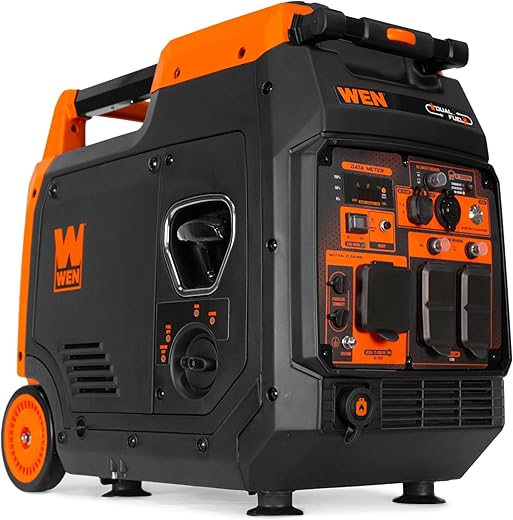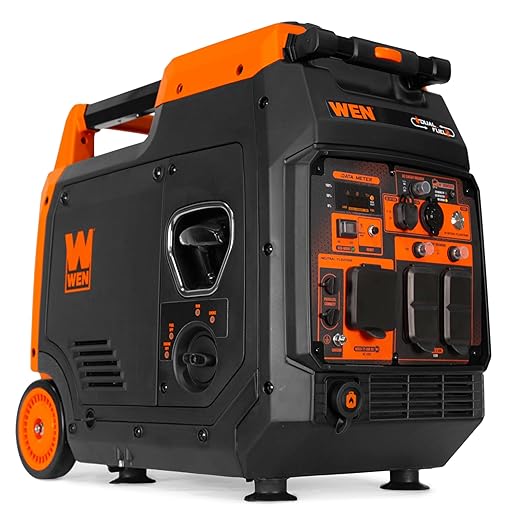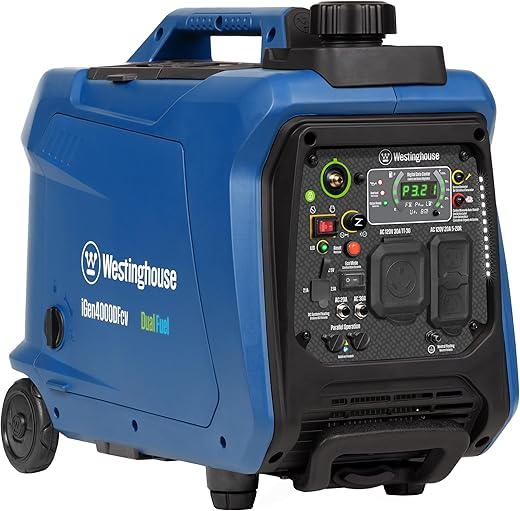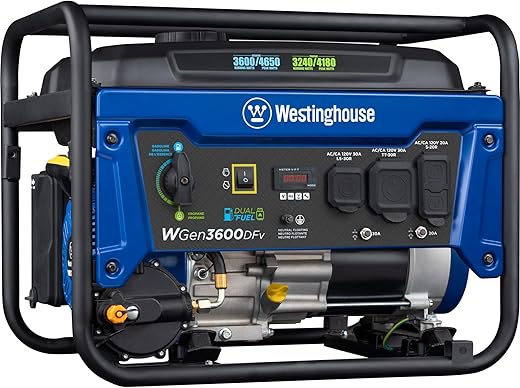In recent years, the trend of off-grid living has gained significant traction, prompting many individuals and families to seek reliable energy sources beyond traditional electric grids. As we look toward 2025, the market is filled with options tailored to diverse needs and environments. In this post, I will explore the six best generators specifically designed for off-grid living, highlighting their features, efficiency, and suitability for a variety of off-grid situations. Whether you’re considering a permanent move or just preparing for emergencies, finding the right generator can make all the difference in your self-sustaining lifestyle.
WEN 4800W Dual Fuel Inverter Generator
The WEN Quiet and Lightweight 4800-Watt Dual Fuel Inverter Generator is an exceptional choice for those seeking reliable and clean power. With a powerful 224cc dual-fuel engine, it effortlessly delivers up to 4800 surge watts on gasoline and can easily connect to a propane tank for even longer runtimes. I appreciate the innovative features, such as the WEN Watchdog CO Shutdown Sensor, which prioritizes safety by automatically shutting down the generator when dangerous carbon monoxide levels are detected, ensuring peace of mind during any outdoor adventure.
Designed with convenience in mind, this generator operates at a modest 62 decibels, making it a discreet companion for camping, tailgating, or backup power at home. I particularly value its portability, thanks to the built-in wheels and telescoping handle, which allow me to move it with ease. Other thoughtful features, like the fuel shutoff to extend engine life and the onboard USB ports for charging devices, enhance its efficiency and usability. Overall, the WEN generator is a testament to quality and innovation, backed by a three-year warranty and excellent customer service.
EF ECOFLOW DELTA 2 Portable Power Station
I am thrilled to share my experience with the EF ECOFLOW Portable Power Station DELTA 2. With a powerful 1024Wh LiFePO4 battery, it offers rapid charging capabilities, reaching 80% in just 50 minutes, making it perfect for home backup and outdoor adventures. The 1800W AC output enables me to power various appliances, from microwaves to lights, without the noise and fumes of traditional generators, and the option to expand capacity up to 3kWh gives me flexibility for longer trips or emergency situations.
What I truly appreciate is the clean energy potential; the DELTA 2 can harness up to 500W from solar panels, ensuring that I stay powered even off the grid. The robust design and long-lasting LFP battery, rated for over 3000 cycles, instill confidence in its durability. Coupled with a seamless app experience for monitoring and control, the DELTA 2 has become an essential part of my camping gear and emergency preparedness toolkit.
WEN 4800W Portable Inverter Generator
The WEN 4800-Watt Portable Inverter Generator is designed with convenience and performance in mind, featuring a powerful 224cc engine that delivers 4800 surge watts and 4000 rated watts. Its electric start ensures easy ignition every time, while the innovative WEN Watchdog CO Shutdown Sensor enhances safety by automatically shutting down the generator when dangerous carbon monoxide levels are detected. The lightweight design, complete with onboard wheels and a telescoping handle, allows for effortless transport, making it ideal for camping or emergency backup.
I have been impressed with its quiet operation, producing minimal noise even when running demanding appliances like microwaves and air conditioners simultaneously. The clean power output is perfect for protecting sensitive electronics, further enhancing its appeal. While the oil maintenance can require some attention, especially with its smaller capacity, the overall performance and reliability of this generator have exceeded my expectations. It’s a robust option for anyone in need of a quiet, efficient power solution.
20W Portable Hand Crank Generator
As I explore the benefits of the 20W Portable Generator, I find it to be an invaluable tool for camping and emergency situations. Its lightweight design makes it easy to transport, while the hand-crank operation allows me to generate power on demand, proving to be particularly useful during off-grid adventures or unexpected outages. The multiple output interfaces provide flexibility, enabling me to manually charge various electronic devices based on my needs.
However, I must acknowledge that efficiency can be a concern. As noted in some reviews, the generator’s performance directly correlates with cranking speed, which can be a bit demanding. While it serves its purpose well and offers great value for the price, I recognize that some users may want to enhance its functionality with additional modifications for a more efficient experience. Overall, it remains a reliable backup power source that I appreciate having on hand.
20W Portable Hand Crank Generator
I appreciate the compact design of the 20W Portable Generator, which is lightweight and easily fits in my hand, making it perfect for camping trips or emergency situations. Its hand-crank operation ensures that I have power whenever I need it, especially during natural disasters or extended power shortages. I find it reassuring that I can manually charge various electronic devices, allowing me to stay connected even in the most remote locations.
While the generator requires some effort to crank, I’ve experienced its reliability firsthand. Sure, the time it takes to charge a device can be extensive, but knowing that I can generate my own electricity in critical moments gives me peace of mind. With multiple interfaces available, I can tailor my power needs, making it an essential addition to my off-grid living supplies.
Explore More Generator Options
Key Factors to Consider When Selecting the Perfect Off-Grid Generator
- Power Output and Fuel Type: I carefully evaluate the generator’s wattage capacity to ensure it meets my energy needs for essential appliances. I also consider the fuel type (gasoline, propane, or diesel) and its availability in my area, as well as the generator’s efficiency and runtime on a full tank
- Portability and Size: It’s essential for me to consider the generator’s weight and dimensions, especially since I may need to transport it to different locations. A compact and portable design will be more convenient for off-grid living. I also look for features such as wheels or handles for easier mobility
- Noise Level and Durability: I pay attention to the generator’s noise level, examining its decibel rating to ensure it operates quietly, which is crucial for maintaining a peaceful living environment. Additionally, I assess the build quality and durability to ensure that the generator can withstand the rigors of outdoor use in various weather conditions
Must-Watch Guide: Top Generators of 2024 – What You Need to Know Before Buying!
Top Choices for Off-Grid Power
Essential Tips and Guidelines for Optimal Generator Use in Remote Settings
- Research and Compare Models: I begin by thoroughly researching the six best generators suitable for off-grid living. I compare their power output, fuel type, size, and noise levels to determine which model fits my specific needs and living situation
- Understand Power Requirements: I assess my power requirements by making a list of all the devices and appliances I plan to use off-grid. This helps me determine the wattage I need from my generator, ensuring that I select one that can handle my load without issues
- Learn Proper Usage and Maintenance: I familiarize myself with the generator’s manual and guidelines for safe operation. This includes learning about refueling, starting procedures, and regular maintenance checks to ensure the generator runs efficiently and lasts longer
Top Picks for Reliable Off-Grid Power
To keep off-grid generators running efficiently, I follow a routine maintenance schedule that includes several key practices:
- Regular Oil Changes: I change the oil as per the manufacturer’s recommendations, usually every 50 to 100 hours of operation or at least once a season. This helps maintain optimal engine performance and reduces wear.
- Air Filter Maintenance: I inspect and clean or replace the air filter regularly to ensure proper airflow to the engine. This is crucial for fuel efficiency and overall performance.
- Fuel System Care: I regularly check the fuel system for leaks and water contamination. It’s important to use clean, fresh fuel and to add fuel stabilizers if the generator will not be used for an extended period.
- Battery Maintenance: For generators with battery systems, I check the battery terminals for corrosion, ensure that the batteries are charged, and maintain the appropriate electrolyte levels if they are not sealed batteries.
- Cooling System Checks: I make sure the coolant levels are adequate and check for any leaks in the system. This includes cleaning any debris from the radiator to enhance cooling efficiency.
- Spark Plug Inspection: I routinely check and clean or replace the spark plugs to ensure reliable starts and efficient fuel consumption.
- Regular Testing: I regularly run the generator under load to test its performance and ensure that it operates as intended. This helps identify any potential issues early.
- Manufacturer Manual Adherence: I always consult the manufacturer’s manual for specific maintenance schedules and recommendations tailored to the particular model I’m using.
By diligently performing these maintenance tasks, I can ensure that my off-grid generator operates efficiently and has a longer lifespan.
Yes, there are several noise considerations to keep in mind when selecting a generator for off-grid living. Generators can produce significant noise, which may be disruptive not only to your own living environment but also to neighbors and local wildlife. Here are the key factors to consider:
- Decibel Rating: It’s important to check the generator’s decibel (dB) rating. Generators typically range from 50 dB (quiet, similar to a normal conversation) to over 100 dB (loud, comparable to a chainsaw). For off-grid living, selecting a unit with a lower dB rating is advisable to minimize disturbances.
- Type of Generator: Inverter generators are often quieter than conventional generators. They produce cleaner power and tend to run at lower RPMs, thereby reducing noise levels. If noise is a priority, I recommend considering this type of generator.
- Location and Installation: The placement of the generator can significantly affect noise levels. I suggest positioning the generator away from living spaces and using sound barriers, like natural vegetation or acoustic panels, to help absorb sound.
- Operating Schedule: I also recommend being mindful of when to operate the generator. Limiting use to certain hours during the day can mitigate noise disturbances, particularly in a communal or natural setting.
- Local Regulations: Checking local regulations or homeowners’ associations for noise restrictions might also be beneficial. Some areas have specific noise ordinances that could impact generator use.
By carefully considering these factors, I can select a generator that meets my power needs while minimizing noise impact, thus enhancing my off-grid living experience.












Anyone have experience with the brands listed? Would love some real feedback!
Did I read that right? The prices seem a bit high! Are they worth it?
I’m definitely leaning towards the Honda generator mentioned here.
Super helpful article! I’ve been looking into generators for my cabin!
This article has me pumped to finally go off-grid! Gonna check these out ASAP!
Just curious, how many watts do I really need for basic appliances?
Interesting choices! I wonder how quiet they are though.
Thanks for the info! Is solar power more reliable for off-grid living?
Great tips! A portable generator is a must for camping trips too!
Love the eco-friendly options! We need more sustainable energy solutions.